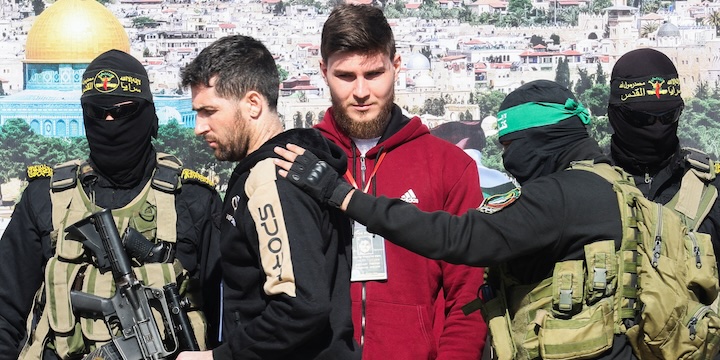US-Israeli Sagui Dekel-Chen and Russian-Israeli Sasha (Alexander) Troufanov, hostages held in Gaza since the deadly October 7, 2023 attack, are escorted by Palestinian Hamas terrorists and Islamic Jihad terrorists as part of a ceasefire and a hostages-prisoners swap deal between Hamas and Israel in Khan Younis, in the southern Gaza Strip, February 15, 2025. Photo: REUTERS/Ramadan Abed
Who is blocking a “ceasefire” in Gaza — Israel or Hamas? If you read the international media, you would assume that it’s Israel, or at least Netanyahu, that is not interested in a peaceful resolution of the conflict.
But are things really as they appear on the surface? Israeli negotiators, including Netanyahu, put forward clear conditions for an end to the fighting: demilitarization of Hamas and its departure from Gaza. Hamas refused both. They even refused a Qatari proposal accepted by Israel.
Hamas demands the complete withdrawal of the IDF from Gaza, the return of UN aid (I wonder whether that would include UNRWA), reconstruction of Gaza followed by what is their understanding of a permanent ceasefire, and a release of all hostages, living and deceased.
Why do I preface permanent ceasefire by “their understanding”? Because for many radical Islamist groups like Hamas, their idea of a permanent ceasefire or end of war differs from its true meaning as understood in the West. The common term in Arabic is hudna, which means limited ceasefire, usually for 5 to 10 years. In the case of Gaza, such a ceasefire would not lead to peace, but just give Hamas a reprieve in war so the terrorists can reorganize, recruit new fighters, obtain new weapons, and rebuild the tunnels — all of it most likely supported and financed by Qatar, the “honest broker,” as well as countries like Iran.
Obviously, Israel should do its best to get the hostages, most importantly the living ones, out of the horrendous tunnels — but should it agree to this “permanent ceasefire”?
There are several possible outcomes, and each of them may end up in renewed fighting. One outcome: not all hostages would be released because Hamas would lose any leverage it has. Holding hostages is the only reason why the remnants of Hamas are still around.
Outcome number 2: the hostages are released, a ceasefire signed, and more Israelis are kidnapped by Hamas in the future — obviously this means new fighting will erupt.
Outcome number 3: hostages are released, the signed ceasefire lasts, but Israel is documenting that Hamas is breaking the ceasefire, such as rearming, building tunnels, expanding its ranks, and organizing terrorist activity in Israel. Does this represent a breach of ceasefire? Of course it does, but how much support would Israel be able to gather from its allies? And what would the support consist of?
Diplomacy, diplomacy, diplomacy — we’ve heard that before, many times. Most recently with Iran, diplomacy was considered superior to bombing Iranian nuclear sites. But Iran made clear that development of their nuclear program, including continuation of higher levels of uranium enrichment, was their sacred right and as such non-negotiable. Yet this did not discourage British and French diplomats from negotiating the non-negotiable.
And even now, after the 12-day war and ceasefire agreement, all the Iranian government is interested in are two things: their nuclear program and persecution of real and perceived opponents and dissidents. Iranian expulsion of UN nuclear program inspectors, posting a video of a manufactured nuclear attack on Israel, imprisoning and executing dissidents and whoever the Iranian police can catch, does not bode well for the ceasefire and for President Trump’s somewhat naïve expectations of a more lasting ceasefire and even an agreement about the abolishment of Iranian’s nuclear program.
Unfortunately, those are just some of the perils of Middle Eastern diplomacy. That double-speak is a big component of what happens there — permanent ceasefire for American and European audiences, hudna for Arabic speakers.
What is missing in this back and forth game is that Israelis were taken for ransom — to get Palestinian terrorists and criminals out from Israeli prisons — and to force concessions from Israel. Hostage taking is a war crime, and is being used by Hamas as blackmail, but this somehow escapes many people in the West.
People should keep this in mind when discussing a “ceasefire” with Hamas.
Jaroslava Halper, a daughter of Holocaust survivors, grew up in communist Prague, experienced the Six-Day and Yom Kippur wars from a distance, but lived through Prague Spring and Soviet invasion of Czechoslovakia in 1968. She escaped to Canada in 1976, where she finished her MD at the University of Toronto. She trained in pathology at the Mayo Clinic, where she also obtained a PhD. She is a professor of Pathology at the University of Georgia in Athens GA. She considers it of utmost importance to defend Israel and Judaism (at least in writing), and fight antisemitism.
The post What Will Israel Get After a ‘Ceasefire’ With Hamas? first appeared on Algemeiner.com.
Click this link for the original source of this article.
Author: Jaroslava Halper
This content is courtesy of, and owned and copyrighted by, https://www.algemeiner.com and its author. This content is made available by use of the public RSS feed offered by the host site and is used for educational purposes only. If you are the author or represent the host site and would like this content removed now and in the future, please contact USSANews.com using the email address in the Contact page found in the website menu.








